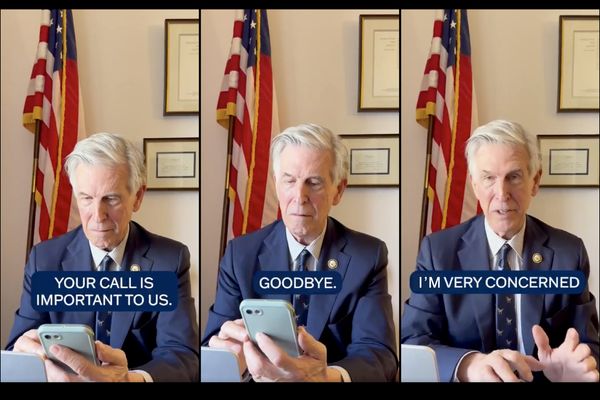
“Trash”, “disposable” and “pretty little fools” are the phrases a poised Ghislaine Maxwell uses to dismiss her underage victims, before asking the audience: “Why are we fussing over them?” when there are more important things to worry about. She offers: “Ocean trash? Single-use plastics? Disposable items piling up?”
This is a key passage in a new play at the Edinburgh fringe, Ghislaine/Gabler, which seeks to understand how Maxwell became a procurer of young women for the disgraced financier Jeffrey Epstein, and how this is fuelled by her victimhood – her obsession with the ocean hints at a complex relationship with her beloved yet bullying father, the media mogul Robert Maxwell, who died by drowning in mysterious circumstances.
The one-woman show is the result of its creator, Kristin Winters, becoming engrossed in a trial that gave insight into a world of both high society glamour and sinister depravity, which led to her researching Maxwell in depth to recreate her on stage.
“She is a complex woman. It’s one of those wonderful things in that the more you pick away at it the more there is there. [The play] is an exploration of a woman who as a child had an abusive father who she idolised, and then she tries to perpetuate that relationship [with Epstein],” Winters said.
The Gabler of the title refers to Hedda Gabler, the eponymous character in Norwegian writer Henrik Ibsen’s classic 1891 play about a woman who is both manipulative and power hungry as well as trapped in a world built for men.
Winters weaves the two characters together by having Maxwell fantasise that she is Gabler to explore “the psychology of someone who uses people” and “the different directions [women] can go in all under ever-present male gaze and male power”.
Both are women who superficially appear to have agency yet for whom “the patriarchy decides their fate”. This is overlaid with a corrosive hunger for financial security based on an “idea you are entitled to privilege that puts you above anyone else”.
“[Maxwell] was totally wrapped up in the men in her life, her father, if he liked her boyfriends, if he didn’t that was it.” She was drawn to Epstein for his similarities to her father, “lying, manipulative, both narcissists for sure”, and enjoyed the fact she had something to offer him – “access to the British elite”, said Winters.
Over months of research, Winters found her perception of Maxwell evolving. “My feelings have got a lot more complex and a lot of deeper and I’ve had a lot of sleepless nights wanting to make sure I’m saying what I want to say.”
While she wants to “make sure this piece doesn’t justify or make excuses”, because “a choice is a choice”, she also looked to capture “the sadness” in Maxwell’s life, as well as her charm and allure.
“Some days I think I understand – ish – and some days it just boggles my mind and sickens me. I don’t think happy people do that, only broken people do. I think we can all be predatory. Unfortunately that’s a human thing, to have a monster that wants to come out, whether it’s rage or jealousy or love, and how we decide to channel that is what makes us different,” she said.
Winters first began writing when Maxwell was arrested in August 2020, and drew on her experiences of lockdown to craft the scenes in solitary confinement which form the backbone of the play, using her dance background to capture “what takes over your body” when you’re left alone.
She also wanted to reflect the victims’ voices, which are featured as first-person narratives drawn from police interviews in the early 2000s. “When you see grown women testify, it’s easy to forget that they were children when this happened,” she said, adding that she studied her 14-year-old cousins to get the tone right.
Winters has performed earlier versions in Brighton, London and New York, where it won an award at United Solo, the world’s largest solo theatre festival. She wanted to bring the final iteration to the fringe – well timed given Maxwell’s sentencing in late June – as she worries the high costs of putting on a show in London and New York stifle creativity and experimentation.
“I think there is an openness here, there is an appetite for work that seeks to make you uncomfortable,” she said.
“I want people to leave with more questions than they came in with. There are moments when you leave and think ‘I quite liked her in that moment, is that OK? That made me think, did I learn something, do I have a different perspective?’”
Ghislaine/Gabler is at Greenside theatre until 29 August







